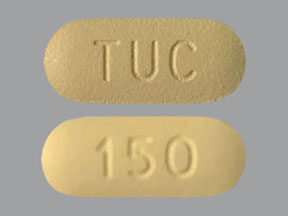Tukysa Side Effects
Generic name: tucatinib
Medically reviewed by Drugs.com. Last updated on Sep 28, 2023.
Note: This document provides detailed information about Tukysa Side Effects associated with tucatinib. Some dosage forms listed on this page may not apply specifically to the brand name Tukysa.
Applies to tucatinib: oral tablet.
Serious side effects of Tukysa
Along with its needed effects, tucatinib (the active ingredient contained in Tukysa) may cause some unwanted effects. Although not all of these side effects may occur, if they do occur they may need medical attention.
Check with your doctor immediately if any of the following side effects occur while taking tucatinib:
More common side effects
- anxiety
- bloody nose
- blurred vision
- burning, numbness, tingling, or painful sensations
- clay colored stools
- dark urine
- decreased or loss of appetite
- dizziness
- fever
- headache
- mood or mental changes
- nausea and vomiting
- nervousness
- pale skin
- pounding in the ears
- severe diarrhea
- skin rash, itching
- slow or fast heartbeat
- swelling of the feet or lower legs
- stomach pain or tenderness
- trouble breathing
- unsteadiness or awkwardness
- unusual bleeding or bruising
- unusual tiredness or weakness
- weakness of the arms, hands, legs, or feet
- yellow eyes or skin
Less common side effects
- muscle spasm or jerking of all extremities
- loss of bladder control
- seizures
- sudden loss of consciousness
Other side effects of Tukysa
Some side effects of tucatinib may occur that usually do not need medical attention. These side effects may go away during treatment as your body adjusts to the medicine. Also, your health care professional may be able to tell you about ways to prevent or reduce some of these side effects.
Check with your health care professional if any of the following side effects continue or are bothersome or if you have any questions about them:
More common side effects
- back pain
- chest tightness
- constipation
- difficulty in moving
- flushing
- loss of weight
- muscle pain or stiffness
- pain in the joints
- redness, swelling, pain of the skin
- scaling of the skin on the hands and feet
- swelling or inflammation of the mouth
- ulceration of the skin
For healthcare professionals
Applies to tucatinib: oral tablet.
Dermatologic adverse events
- Very common (10% or more): Palmar-plantar erythrodysesthesia syndrome (63%), rash (e.g., rash maculopapular, rash, dermatitis acneiform, erythema, rash macular, rash papular, rash pustular, rash pruritic, rash erythematous, skin exfoliation, urticaria, dermatitis allergic, palmar erythema, plantar erythema, skin toxicity, dermatitis) (20%)[Ref]
Gastrointestinal
- Very common (10% or more): Diarrhea (81%), nausea (58%), vomiting (36%), stomatitis (e.g., stomatitis, oropharyngeal pain, oropharyngeal discomfort, mouth ulceration, oral pain, lip ulceration, glossodynia, tongue blistering, lip blister, oral dysesthesia, tongue ulceration, aphthous ulcer) (32%)[Ref]
Hematologic
- Very common (10% or more): Hemoglobin decreased (59%), decreased phosphate (57%), anemia (e.g., anemia, hemoglobin decreased, normocytic anemia) (21%)[Ref]
Hepatic
- Very common (10% or more): Bilirubin increased (47%), ALT increased (46%), AST increased (43%), hepatotoxicity (e.g., hyperbilirubinemia, blood bilirubin increased, bilirubin conjugated increased, alanine aminotransferase increased, transaminases increased, hepatotoxicity, aspartate aminotransferase increased, liver function test increased, liver injury, hepatocellular injury) (42%)[Ref]
Metabolic
- Very common (10% or more): Anorexia (25%), weight loss (13%), magnesium decreased (40%), potassium decreased (36%), alkaline phosphate increased (26%)[Ref]
Musculoskeletal
- Very common (10% or more): Arthralgia (15%)[Ref]
Renal
- Very common (10% or more): Creatinine increased (33%)[Ref]
Respiratory
- Very common (10% or more): Epistaxis[Ref]
References
1. (2020) "Product Information. Tukysa (tucatinib)." Seattle Genetics Inc
2. (2023) "Product Information. Tukysa (tucatinib)." Seagen Inc, v04
Frequently asked questions
- How effective is tucatinib (Tukysa) for breast cancer?
- What’s the difference between tucatinib and neratinib?
- What's the mechanism of action for tucatinib?
More about Tukysa (tucatinib)
- Check interactions
- Compare alternatives
- Pricing & coupons
- Drug images
- Dosage information
- During pregnancy
- FDA approval history
- Drug class: HER2 inhibitors
- Breastfeeding
- En español
Patient resources
Professional resources
Related treatment guides
Further information
Tukysa side effects can vary depending on the individual. Always consult your healthcare provider to ensure the information displayed on this page applies to your personal circumstances.
Note: Medication side effects may be underreported. If you are experiencing side effects that are not listed, submit a report to the FDA by following this guide.

